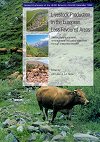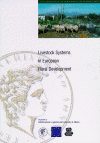 The James Hutton Institute
The James Hutton Institute
This page is no longer updated. The Macaulay Land Use Research Institute joined forces with SCRI on 1 April 2011 to create The James Hutton Institute.
 |
Meeting future economic, environmental and policy objectived |
The Agenda 2000 reform package of the CAP will result in commodity prices for livestock and crops to continue their downward trend, and this will put an increasing pressure on farmers and farmer’s co-operatives to seek out new quality markets for their products. Within the LFAs, future policies will place increased importance on rural development, sustainable farming and environmental management. To maintain an industry based on the small to medium sized family farm, particularly in the LFAs, farmers need, where possible, to exploit niche markets by direct marketing, quality labelling, organic farming, or regional identification, to generate added value to their products.
The LSIRD network has considered how these diverse issues in rural development, value adding and environmental management can be addressed by future agricultural research, and has identified future interdisciplinary and vertically integrated (production chain) approaches to studying problems facing the economic development of livestock systems in the LFAs.
The LSIRD network has sought to stimulate and integrate ongoing research in Europe that is currently contributing to the development of both economically and ecologically sustainable farming systems appropriate for the EU LFA regions. A book, “Livestock production in the European LFAs: Meeting future economic, environmental and policy objectives through integrated research” is published this week by the Macaulay Land Use Research Institute which collects together the experiences of projects from around Europe addressing the maintenance of livestock agriculture in the
LFAs. The book demonstrates the wealth of experience and enthusiasm within the research and extension sectors in defence of an increasingly threatened way of life. This enthusiasm needs to be channelled into a wide range of well-networked projects throughout rural areas, as well as into developing policy mechanisms that will allow a healthy balance to be struck between economic and environmental pressures for the benefit of all rural land users.
For further information please contact Jerry Laker on 01224 318611
Copies of the report "Livestock production in the European Less Favoured Areas" (208 pages) are available, price £35 (56 Euro), from Jerry Laker, LSIRD network, Macaulay Land Use Research Institute, Craigiebuckler, Aberdeen. AB15 8 QH. Tel: +44 (0) 1224, 318611, fax: +44(0)1224 311 556,
email: j.laker@macaulay.ac.uk.
 |
Proceedings of the LSIRD Nafplio Conference |
The report describes the proceedings of a recent conference in Nafplio, Greece which looked at the different aspects of livestock farming in the LFAs - overcoming the physical constraints, realising maximum product value and managing vegetation effectively and sustainably.
"One of the lasting impressions of the Nafplio conference was the degree of consensus on rural development issues. In particular, participants agreed that it is essential that farmers in the LFAs take on board sustainable agriculture principles, and exploit to the fullest extent the opportunities offered by activities, such as regional and eco-labelling, on-farm processing and marketing, which add value to the product, and where appropriate develop co-operative ventures between rural production and retailing enterprises," said Jerry Laker, the coordinator of LSIRD and one of the editors of the report, based at the Macaulay Land Use Research Institute.
This drive to integrate rural development initiatives is opening up new challenges for research and the LSIRD network has been set-up to bring together leading European researchers to share ideas and develop co-ordinated research programmes. This publication highlights the fact that livestock farming in the LFAs is developing as a distinct research field in its own right. The conference was one of the first of a series of events organised by the LSIRD network which will look at different research approaches for appropriate and sustainable livestock production as an integral element of European rural development.
For further information please contact Jerry Laker on 01224 318611
Copies of the report "Livestock Systems in European Rural Development" (162 pages) are available, price £20, from Jerry Laker, LSIRD network, Macaulay Land Use Research Institute, Craigiebuckler, Aberdeen. AB15 8 QH. Tel: +44 (0) 1224, 318611, fax: +44(0)1224 311 556, email: j.laker@macaulay.ac.uk.